Behind the News
Behind the News: All the backstories to our major news this week
Published
1 year agoon

Over the past week, there were lots of important stories from around the African continent, and we served you some of the most topical ones.
Here is a rundown of the backstories of some of the biggest news stories in Africa that we covered during the week:
African leaders in panic mode as another coup hits the continent
Barely a month after Niger’s Mohamed Bazoum was ousted from power in a military coup, the world was greeted with the news of a fresh military takeover in another African country, this time in Central Africa—Gabon— as a group of senior military officers announced taking over power.
The officers made the announcement minutes after the Gabonese Election Centre announced President Ali Bongo as the winner of the last presidential election for a third term. The coup ended the over fifty-year rule of the Bongo family.
Opposition parties in the country had formed a coalition to end the 56-year dynasty under the aegis of Alternance 2023, and adopted the candidacy of former minister and university professor, Albert Ondo Ossa.
The latest coup in the continent has drawn reactions from across the continent and beyond, with major tweaks in military architecture in some countries. President Paul Kagame of Rwanda announced the retirement of hundreds of senior military officers at the same time as the promotion of young soldiers. Also, new generals have been chosen to command army divisions spread across the nation.
Among the retirees are prominent leaders from Rwanda’s 1994 liberation conflict, including Gen. James Kabarebe, Gen. Fred Ibingira, and Lt. Gen. Charles Kayonga. Prior to this, both Kabarebe and Kayonga served as the Rwandan army’s chief of defence staff.
In a similar move, President Paul Biya of Cameroon, one of the continent’s longest-serving heads of state, implemented new appointments inside the Defence Ministry’s central administrative unit.
Libya, Israel in fresh diplomatic rift
The week started with Israel’s foreign ministry in a statement on Sunday confirming its official meeting with Libya’s foreign minister in Italy last week, and that discussions were ongoing with “potential for cooperation.” But the decision would soon become the subject of controversy as Libyan Foreign Minister, Najla Mangoush, was later suspended following her meeting with Foreign Minister Eli Cohen of Israel despite the countries not having formal relations.
The diplomatic brouhaha deteriorated to the point that Libyan Prime Minister, Abdulhamid al-Dbeibah, visited the Palestinian embassy for what seemed like an attempt at reiterating Libya’s loyalty to Palestine and affirming his country’s continued support for the Palestinian cause.
He stated that his country supported the Palestinians and that his suspended foreign minister did not speak for the government during his meeting with his Israeli counterpart.
Libya is a strong ally of Palestine, whose relations with Israel have been strained since the end of the nineteenth century when the Israeli state was created, which led to the first Arab-Israeli War. The war ended in 1949 with Israel’s victory, but 750,000 Palestinians were displaced.
The United States made an effort to restart the peace negotiations between the Israeli government and the Palestinian Authority in the West Bank in 2013, but the 2014 formation of a unity government between Fatah, the Palestinian Authority’s main party, and its antagonistic component, Hamas halted the peace negotiations. And it appears Libya has remained an interested party in the conflict between the Arab neighbours.
Concerns over growing tax evasion, incentives in Africa
The third African Conference on Debt and Development (AfCoDD III) kicked off in Senegal during the week and one of the resolutions was the state of the tax administration in the continent. A panel of experts at the summit posited that multilateral corporations in Africa were reported to be using the informal sector to evade tax.
It is said that multilateral corporations are leveraging the informal sector to escape taxes, which is one of the reasons African nations are struggling to raise domestic earnings.
According to estimates from the United Nations Conference on Trade and Development (UNCTAD), Africa loses significant resources as a result of illegal money flows (IFFs). These flows come from a variety of sources, including money made from criminal activity, tax evasion, profit-shifting abuse, trade mis-invoicing, and corruption, among others.
Trade mispricing, or the false setting of prices for goods or services sold between a company’s subsidiaries in order to evade taxes, is one of the methods used by the majority of multilateral cooperations in this respect. A different strategy is to campaign for tax incentives as a reward for establishing or keeping a commercial presence in African nations.
The drop in investment and the lack of public funding that impedes development have both been linked to tax policies across the continent. Several nations, including Senegal, Kenya, and Nigeria, recently proposed tax revisions. Nigeria’s Presidential Tax Reform Committee on Friday pushed for a reduction in tax waivers for corporate entities in the country as tax incentives hit N6tn annually.
Executive, Legislature face off in Lagos over political appointees
The political face-off in Nigeria’s commercial capital, Lagos, took a fresh dimension on Monday after the Speaker of the State House of Assembly, Mudashiru Obasa defended the decision of the House to reject 17 of the 39 commissioner-nominees sent by Governor Babajide Sanwo-Olu for screening last week.
Lagos is the political home of President Bola Tinubu, who lost the state to the Labour Party during the February 2023 presidential elections.
Some observers have attributed the ruling party’s (APC) performance in the state at the presidential elections to Sanwo-Olu’s limited reach at the grassroots. The same factor has been linked to why the state legislators rejected some of his potential appointees.
Obasa questioned some of the governor’s appointees, most of whom were in his last cabinet, including the likes of Prof. Akin Abayomi, Mr. Gbenga Omotosho, and Mrs. Folashade Ambrose.
It is believed that the state lawmakers’ decision is backed by party faithful in their constituencies who reportedly prefer popular grassroots candidates as appointees. But the matter has led to a bigger question of what should guide the loyalty of politicians. What difference does the political base of appointees make in governance?
Another angle to this is the case of “prebendalism”—a system appropriation of state offices—notably elected officials and government workers and the diversion of public resources to serve themselves, their cronies and their ethnic and other identity groups.
You may like
-
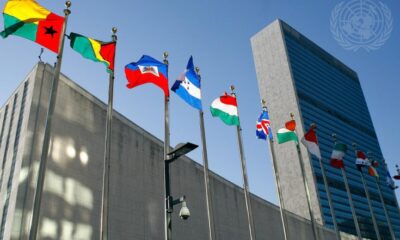

Behind the News: All the backstories to our major news this week
-


Behind the News: All the backstories to our major news this week
-


-
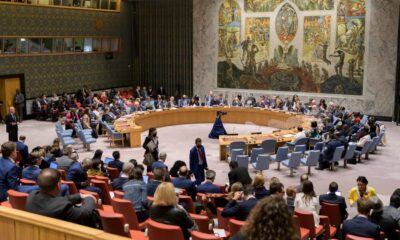

Behind the News: All the backstories to our major news this week
-


Behind the News: All the backstories to our major news this week
-


Behind the News: All the backstories to our major news this week
Behind the News
Behind the News: All the backstories to our major news this week
Published
4 weeks agoon
October 18, 2024
Over the past week, many important stories from around the African continent were published, and we served you some of the most topical ones.
Here is a rundown of the backstories to some of the biggest news in Africa that we covered during the week:
Another look at Africa’s debt crisis
Conversations around Africa’s public debt were on the table during the week as Achim Steiner, administrator of the United Nations Development Programme, stated on Monday that the world’s poorest countries were unable to meet sustainable development targets because they had to prioritise debt payments over investments.
Addressing a gathering in Hamburg, Steiner asserted that the world financial crisis was impeding countries’ ability to accomplish the objectives, which include eradicating hunger and poverty, increasing access to healthcare and education, providing sustainable energy, and protecting biodiversity.
Since the COVID-19 pandemic’s pervasive effects on economies, the majority of the continent’s nations have suffered with both internal and international debt; yet, few have achieved much in the fight for debt restructuring under the G20 framework.
Numerous African nations, including Egypt, Tunisia, Nigeria, Ghana, Zambia, and others, are struggling with significant foreign debt. Together with Zambia and Ghana, Ethiopia will be a part of a thorough restructuring known as the “Common Framework.”
At the opening ceremony of the annual African Union summit in Ethiopia last year, UN Secretary-General Antonio Guterres made the case for changes to the international financial system’s structure to better meet the requirements of developing nations.
Africa’s whole external governmental debt as of 2021 was 726.55 billion USD. The amount of foreign public debt increased from 696.69 billion dollars in comparison to the previous year.
Concerns are being raised by the rising debt levels in Africa, which could not only hinder economic growth but also make repayment nearly difficult for many of these nations. This begs an important question: When does debt stop being beneficial and instead start to negatively impact a nation’s economic performance?
Kenya remains committed to Haiti, but what does it stand to gain?
Kenya will support an international anti-gang effort in Haiti next month by dispatching an additional 600 police officers there. Haiti’s prime minister was in Kenya to expedite the deployment of the military.
At least eleven countries have pledged to send more than 2,900 soldiers to participate in the Multinational Security Support (MSS), led by Kenya.
Kenya, whose participation in international peacekeeping missions is longstanding, declared earlier this year that it would be deploying 1,000 police personnel, citing as a starting point its assistance to a bordering country.
Approximately 600,000 individuals have been internally displaced due to gang conflict, and hundreds of thousands of aspiring migrants have been deported back to Haiti, where approximately 5 million people are facing extreme famine. October marks the end of the mission’s first 12-month term. As gang violence worsened in 2022, Haiti turned for the first time to foreign assistance.
Nevertheless, it failed to identify a leader prepared to assume the helm and numerous foreign governments were reluctant to back the unelected administration in the desperately poor nation.
Kenya gains significant political value by sending its troops to Haiti on the international scene. Kenya has gained international recognition as a trustworthy ally that is eager to assist other nations. The mission opens up various opportunities. Prior to deployment, Kenyan law enforcement forces will receive specialist training and equipment. In the long term, this will increase the force’s capacity. Of course, there are monetary rewards as the participating nations receive allocations of resources. Because troops will receive additional pay, officers are very interested in being deployed overseas.
Cameroon: ‘Healthy’ Biya remains out of sight
Cameroon’s president, Paul Biya can now be likened to the proverbial cat with nine lives as the 91-year-old has remained “healthy” following latest reports of his death during the week. Rumours have been circulating about Cameroonian President Paul Biya’s possible death in a military hospital in France due to his extended absence. This rumour stems from Biya’s prolonged absence following the September China-Africa Summit when he was anticipated to head back to Cameroon almost away.
As of November 6, 1982, Biya, who is 91 years old, has been in office for 42 years. He is the oldest head of state in Africa, the longest-lasting non-royal national leader worldwide, and the second-longest serving president overall. According to rumours, Biya’s oldest son Franck Emmanuel Biya may be named as his replacement for “continuity” in France.
Since its political independence from France and Britain in the early 1960s, Cameroon has only had two presidents. The country is currently dealing with two serious crises: a deadly Boko Haram insurgency in the north and a separatist conflict that has claimed thousands of lives.
President Biya is one of several long-serving African leaders, including Yoweri Museveni of Uganda, who has been in office since 1982, and Teodoro Obiang Nguema Mbasogo of Equatorial Guinea, Rwanda’s Paul Kagame is also gradually evolving into the group.
Things get tougher for embattled Kenyan Deputy President
During the week, the deputy president of Kenya was impeached by the National Assembly due to charges of corruption and abuse of power. In a vote held Tuesday night, lawmakers decisively decided to remove Rigathi Gachagua from office. The Senate will now decide what will happen to the deputy president.
Parliament adopted a proposal to remove Kenya’s deputy president from office, and on Wednesday, the matter was brought to the Senate for consideration. The National Assembly heard a nearly ninety-minute defence of troubled deputy president Rigathi Gachagua and his allies prior to the vote.
A surge of protests targeting President Ruto’s government has been occurring in Kenya over the last four months due to accusations of corruption made by certain lawmakers and government officials. High taxation and the parliament’s purported inability to act independently of the president were other issues that Kenyans objected to. Gachagua refutes the accusations made by certain lawmakers, who claim that the deputy president assisted in planning rallies against the government.
He supported Ruto in his election victory in 2022 and assisted in obtaining a sizable portion of the vote from the populated central Kenya region. Gachagua, however, has mentioned feeling marginalised in recent months, despite extensive claims in the local media that he and Ruto have strained political ties.
After widespread protests over unpopular tax increases in June and July that claimed more than 50 lives, Ruto sacked the majority of his cabinet and appointed members of the main opposition.
Gachagua infuriated many in Ruto’s coalition by comparing the government to a business and implying that people who supported the coalition had first claim to development projects and jobs in the public sector. Ruto has not yet publicly commented on the impeachment proceedings.
Behind the News
Behind the News: All the backstories to our major news this week
Published
2 months agoon
October 3, 2024
Over the past week, many important stories from around the African continent have been published, and we have served you some of the most topical ones.
Here is a rundown of the backstories of some of the biggest news in Africa that we covered during the week:
Musings on CBN rates across Africa: Ghana, Nigeria, and South Africa
During the week, many African countries announced monetary policy decisions. The Central Bank of Nigeria decided unanimously on Tuesday to raise its benchmark interest rate by an additional 50 basis points, to a new record high of 27.25%. This is the sixth hike in a row this year. The decision was made in an effort to reduce inflation, strengthen the naira, and draw in capital. Governor Olayemi Cardoso reaffirmed the bank’s commitment to controlling inflation and underlined how several rate hikes have contributed to its moderation.
Nigeria’s West Africa neighbour followed suit on Friday as the Bank of Ghana reduced its benchmark monetary policy rate by 200 points to 27% at a normal meeting. With inflation having slowed and disinflationary pressures mounting, this is the first decline in eight months and the steepest since March 2018. August 2024 saw a fifth consecutive month of decline in Ghana’s annual consumer inflation, which was still much higher than the central bank’s medium-term target range of 6% to 10%. The country’s annual inflation rate dropped to a nearly two-and-a-half-year low of 20.4% from 20.9% in July.
A week prior, as anticipated, the South African Reserve Bank decreased its benchmark interest rate by 25 basis points to 8% after holding seven consecutive meetings at a 15-year high of 8.25%. As price pressures decreased, the SARB is loosening policy for the first time since the epidemic in 2020
As monetary varying shifts across the continent continue, African nations are still facing numerous severe shocks and significant structural challenges, such as rising food and energy prices brought on by geopolitical tensions like Russia’s invasion of Ukraine, climate issues that impact agriculture and energy production, and ongoing political instability.
Africa’s real GDP growth slowed to 3.1% in 2023 from 4.1% in 2022 as a result of this difficult climate. With growth predicted to reach 3.7% in 2024 and 4.3% in 2025, the economic picture is projected to improve going ahead, underscoring the resilience of African countries.
Zambia and its post-drought plans
Zambia’s finance minister, Situmbeko Musokotwane stated on Friday that the nation intends to quickly recover from its worst drought in living memory and cut its budget deficit in half the following year.
The minister stated in a budget address that the copper producer hopes for a 6.6% growth in 2025, as opposed to a projected 2.3% increase in 2024. The country is aiming for a speedy recovery. as the government crop assessment data shows that over nine million people are affected in 84 of the 117 districts after suffering through the driest farming season in over forty years, which has led to considerable crop losses, an increase in livestock deaths, and worsening poverty,
Real GDP increased gradually between 2022 and 2023, from 5.2% to 5.8%. The supply side was driven by mining and quarrying, wholesale and retail commerce, and agriculture; the demand side was driven by consumer and business spending. Food prices, transit expenses, and the nominal exchange rate are the key drivers of inflation, which is expected to remain elevated and reach 11.0% and 10.9% at the end of 2022 and 2023, respectively.
The economic challenges faced by Zambia are exacerbated by the drought, especially when considering its debt load. Its debt restructuring talks under the G20 Common Framework have progressed far more slowly than was originally anticipated when the Common Framework was first proposed.
In 2017, Zambia was placed under debt distress, and as a result, non-concessional lending from multilateral development banks was discontinued. It’s possible that by overestimating sovereign risks, the main credit rating firms exacerbated the debt crisis and dealing with a post-drought crisis might just be another “too high hurdle”
As the World Bank and Uganda LGBTQ saga continues
The World Bank is taking more action in support of Uganda’s LGBTQ community. The global lender announced on Wednesday that it is implementing steps to guarantee that lenders to Uganda are not subjected to discrimination due to a severe anti-gay law. According to a World Bank representative, both new and continuing projects would be subject to the procedures, which also include an impartial monitoring system to guarantee compliance.
Same-sex partnerships are forbidden and punishable by life in prison; similarly, anyone convicted of “aggravated homosexuality” faces the death penalty. The Anti-Homosexuality Act (AHA) was passed by Uganda, a largely conservative nation, in May of last year and it has led to considerable Western censure and US penalties.
Other than Uganda, several African nations have strict laws that discriminate against individuals who identify as LGBTQ. Hakainde Hichilema, the president of Zambia, issued a warning in March to supporters of the LGBTQ movement to stop endorsing homosexuality. He also asked that Zambia “maintain laws that abhor alien orientations like gayism and lesbianism.”
South Africa, which has a constitution that forbids discrimination based on sexual orientation, was the first and only African nation to legalise same-sex marriage in 2006. Some African nations, such as Angola, Mozambique, Botswana, Lesotho, Mauritius, and Seychelles, have laws that are favourable to the continent’s population but Uganda appears to be unbothered or tempted despite the many causes and costs of its anti-gay stand.
Ahead of Tunisia’s presidential election
During the week, another Tunisian presidential candidate Ayachi Zammel was convicted and sentenced to six months imprisonment for using “fraudulent certificates” as opposition voices in the North African country continue on attack as President Saied positions himself for what is likely to be a reelection, as all but one of the opposition candidates are either incarcerated or have had their eligibility ruled invalid by the Tunisian electoral commission.
On September 19, a third candidate who had received the election commission’s approval was sentenced to 20 months in prison. Saied, who is currently running for reelection for a second five-year term, was originally elected in 2019 as an anti-establishment candidate who pledged to combat poverty and eradicate corruption. However, in 2021 he declared that he would rule by decree after overthrowing Mohamed Ennaceur and the elected parliament, a move denounced as a coup by the opposition and the international community.
Additionally, he has deployed more oppressive strategies, which may indicate that he is not confident in his ability to win with conviction. His severe actions could indicate a new stage in Tunisia’s democratic backsliding and foreshadow more crackdowns and turmoil during an inevitable second term.
Meanwhile, concerns exist over potential voting turnout as well. Under Saied, Tunisia has conducted three elections, with dismal voter turnout in each. Less than one-third of voters cast ballots in favour of a new constitution that solidified Saied’s power and overthrew the 2014 charter in July 2022. After Saied dismissed the previous legislature in December 2022, only 11% of voters cast ballots for new members of parliament, which is among the lowest turnout percentages ever recorded in a national election worldwide. The next December, Saied called elections for a new second house of parliament, repeating this dubious performance.
EDITOR’S PICK


Military advisors from Russia arrive Equatorial Guinea
Russian military advisors are in Equatorial Guinea training indigenous soldiers. Anonymous sources cited by Reuters during the week claim that...
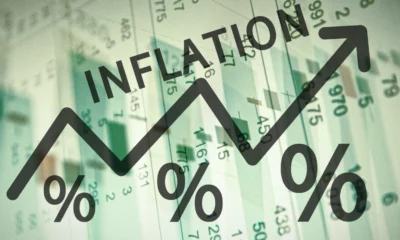

Food prices drive second straight monthly hike in Nigeria’s inflation
According to official statistics released on Friday, Nigeria’s inflation rate increased for the second consecutive month in October, rising to...


Morocco’s Mpox test gets African CDC endorsement
A major step forward in Africa’s response to the continuing epidemic was taken Thursday when the Africa Centres for Disease...


MTN financial report reveals drop in group service revenue
Due to operational difficulties in Sudan and the depreciation of the Nigerian naira, MTN Group, Africa’s largest telecom provider, announced...


Nigeria’s $700bn mining potential attracts investors worldwide
Diplomatic sources cited in a local report have claimed that global investors are interested in Nigeria’s mining sector reforms under...


South Africa FA President Danny Jordaan detained. Here’s why
Danny Jordaan, the president of the South African Football Association (SAFA), was taken into custody on Wednesday on suspicion of...
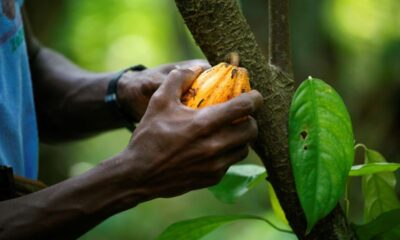

Ivory Coast to create $500 million green financing fund
Ivory Coast will establish a $500 million green financing fund to assist sustainable growth, the IMF said. Africa’s 54 countries...


Russia claims African, ex-Soviet nations want its mpox vaccine
Several African and former Soviet nations have shown interest in purchasing Russia’s smallpox and Mpox virus vaccine, testing equipment, and...


Mpox immunisation scarcity slows Kinshasa’s epidemic fight
A lack of mpox vaccine doses has prevented the Democratic Republic of the Congo from starting a campaign in the...


Nigeria has become a ‘failing state’ under Tinubu— Ex-President Obasanjo
YFormer Nigerian President, Olusegun Obasanjo, has described the country under incumbent President Bola Tinubu as a “failing state” which is...
Trending
-
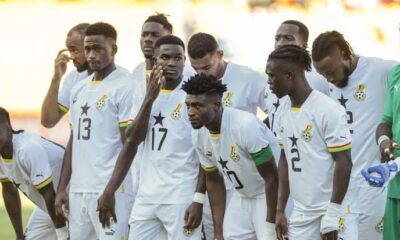
 Sports1 day ago
Sports1 day agoGhanaians in tears as Black Stars fail to make AFCON 2025y
-
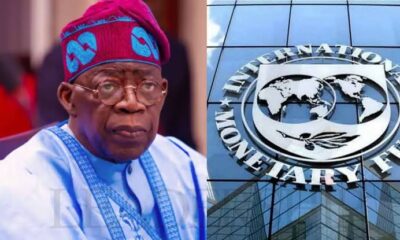
 Metro1 day ago
Metro1 day agoTinubu’s reforms in Nigeria not working— IMF
-

 Metro6 hours ago
Metro6 hours agoNigeria has become a ‘failing state’ under Tinubu— Ex-President Obasanjo
-

 Culture8 hours ago
Culture8 hours agoChidimma Adetshina makes history as she emerges first runner-up for Miss Universe 2024


